With a colleague I decided to visit the re-opened and refurbished/developed 1914 Hyde Park Picture House in Leeds to see La syndicaliste with a towering performance by Isabelle Huppert. I was gripped by the film for just over two hours and I haven’t watched anything quite so compelling for a while. My colleague had the same reaction. I’m not going to claim the film is perfect by any means but I think it should engage and entertain any viewer as long as they have some basic knowledge of how the French legal and political system works. That caveat may partly explain some of the negative comments by some UK reviewers.
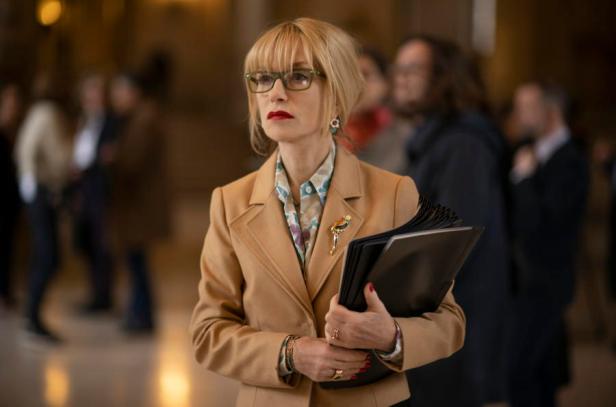
The film is an adaptation of a book of investigative journalism by Caroline Michel-Aguirre, so it is a ‘based on a true story’ narrative. The woman at the centre of the story has seen the film (having not participated in its production in any way) and has supported it after she recovering from the the impact of re-living the events of the story. One of the criticisms of the film seems to be that it is a straight re-telling of a complex story but also that it exploits the woman whose story it tells. Neither point seems valid to me and indeed some reviewers recognise that a straight, conventional approach to a complex narrative is perhaps the most sensible choice. Another complaint is that the pacing is too slow. This seems nonsense to me. If it was any faster I think my head might explode. I should also point out that the story ends with a title informing us that one of its outcomes was another catastrophic decision by the UK’s most incompetent government for decades, but more on that later.
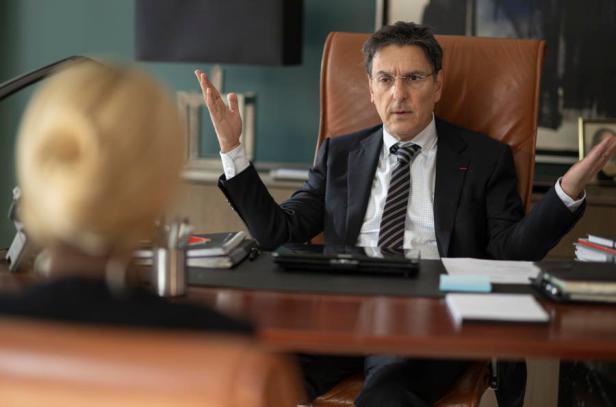
The central character in real life is ‘Maureen Kearney’, which UK audiences will realise is an Irish name. She moved to France in her twenties to teach English and eventually joined the French company Areva, a majority state-owned company engaged in all forms of engineering associated with nuclear power. Her original job was to teach English to technicians who were being sent out to do fieldwork in Africa and elsewhere. But Kearney came from a family of trade unionists and after joining the union at the plant she eventually rose to a senior position representing all the union members of CFDT (the largest French union) at Areva and sitting on the board of the company. The French title of the film simply means ‘The trade unionist’.
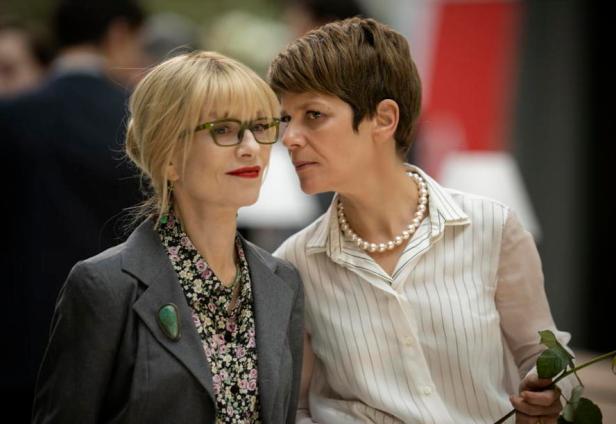
In the film, Isabelle Huppert plays Maureen. She doesn’t attempt to represent ‘Irishness’ in any way, but Huppert speaks English fluently and she is costumed and made up for the part so that she does resemble the real Maureen Kearney. Huppert and Kearney are roughly the same age, Huppert being just two or three years older. But since the film starts in 2011, Huppert must try to look as if she is in her late fifties rather than her late sixties. The makeup flattens out any lines of ageing and the bright clothes, glasses and blonde hair help to represent Kearney. Much has been made of the glasses she wears and the fact that Huppert, who is often very still, acts very well only using her eyes. The film narrative begins with Kearney’s visit to a plant in Hungary where female workers face the sack by their misogynistic boss because of low productivity and she vows to help them. In 2011 the right-wing Sarkozy government was coming to its end. The position of Areva as a state-controlled corporation is crucial here. The CEO of Areva, a woman who supported Kearney, was replaced but expected to be given a job by the new regime of the Socialist Francois Hollande. But this didn’t happen and Kearney was left isolated and threatened by the new male CEO. At this point Kearney was given information by an EDF whistle-blower about a plot to eventually replace Areva as the leading French nuclear company with EDF, a smaller state-controlled company and at this point only an electricity supplier, that was going to ally with Chinese nuclear interests. Kearney recognised a threat to her workers but found it difficult to interest the new government ministers. Her new CEO branded her an ‘hysteric’.
She then suffered from a seemingly random smash and grab of her bag from her car by a motorcyclist and accomplice. She dealt with this calmly but then was attacked in her home by an unknown assailant, bound, gagged and sexually assaulted. At this point the narrative changes and focuses on the police investigation of the assault which eventually concluded that she invented the attack as part of a mental breakdown. Her attempt to clear her name after this accusation took the next 5-6 years and forms the second part of the narrative. There is so much in the film that I’ve already begun to wonder if I’ve remembered the narrative structure correctly. What is important is that the assault is actually shown differently a couple of times and in effect Kearney is assaulted several times as both the police and she herself attempt to re-enact what happened. Kearney is a woman with some incidents in her past which might make her a mixture of strength and vulnerability. Her calmness post the attack may be a psychological response to ‘zone out’ from the horror and the degradation (including the police forensics medical examination). The film plays deliberately with the audience to make us wonder if she could have imagined everything or if she has genuinely distanced herself from what has happened.
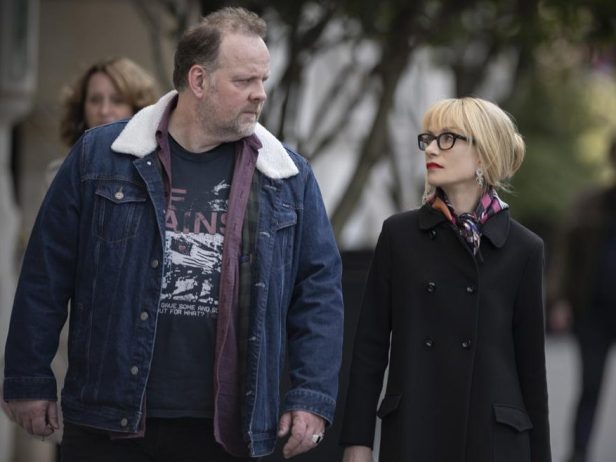
It’s worth noting here that the issue of rape reporting and investigation is important for feminists in France as it is in all countries, but that French feminists do not always formulate arguments in the same way as their Anglo-Saxon sisters. I don’t want to spoil the narrative but the melodrama of her treatment by the police and the impact on her family (her husband and grown-up daughter) is an important aspect of what follows.
If I have a problem with the film it comes from my ignorance of certain aspects of French police jurisdictions and from my long viewing of the French TV series Engrenages, whose cops led by Caroline Proust’s Laure Berthaud would certainly have sorted this case. Kearney and her husband are shown as living not in Paris but some 20 plus miles from the centre. (They also have a lakeside holiday home in Annecy.) Their home, where the assault occurred, was shot in Rambouillet, a small community in Yvelines département (according to IMDb). The case is therefore investigated by the Gendarmerie rather than the Paris city police force with its major crime squads. I would have thought that a woman who was in contact with French government ministers and had arranged an interview with the President himself before the assault would be investigated by a major Parisian unit. The senior Gendarmerie officers in this case are represented as misogynistic, incompetent and possibly corrupt in their dealings with Kearney. There is a terrifying scene during Kearney’s interrogation when she is suddenly confronted with a man she has never seen before who appears supremely evil and aggressive. He certainly terrified me. In a very interesting interview in The Arts Desk, written by Nick Hasted, the film’s director Jean-Paul Salomé explains: “In French we say barbouze (“fake beards”, first used for secret operatives in the Algerian War), not a spy, but in the shadows of the police”. He goes on to explain how he and Huppert managed this scene so effectively.
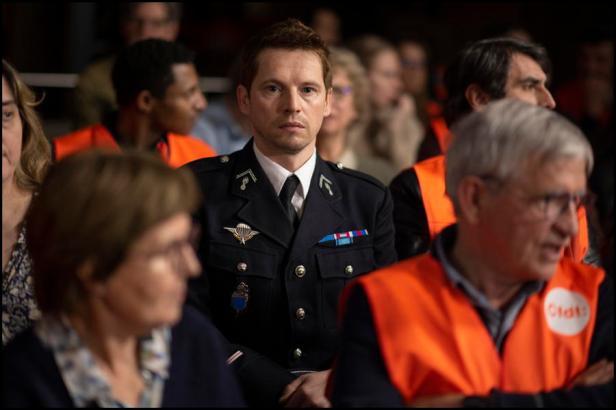
There are two ‘outcomes’ to the story. One is about what happened to Maureen Kearney andI think you will want to follow that narrative yourself but the other is about the French nuclear industry and that is dealt with succinctly in an on-screen title at the end of the film. EDF and the Chinese went ahead, Areva collapsed and thousands of workers lost their jobs. EDF and the Chinese became involved in contracts to build very expensive nuclear power plants in the UK. The Tory energy policy in the UK is as muddled as the rest of their policies. In this case they have had to ‘buy out’ the Chinese in the Sizewell C Project and are left with EDF, the company indicted in this film, as one of the major players in the UK’s energy future. The other major nuclear development at Hinckley in Somerset is also being built by EDF.
La syndicaliste is distributed in the UK by Modern Films, an innovative small company with a refreshing outlook and a library of around 100 global films built up since the company’s launch in 2017. They have in this case retained the French title of the film for the UK. Elsewhere (i.e. in the US and Australia, I think) the title is The Sitting Duck. I’ve thought about this title quite a bit and perhaps it could be argued as appropriate but I don’t think a potential anglophone audience will be attracted to see the film other than as a comedy or possibly a satire. It feels more like an insult addressed to Maureen Kearney. I’m assuming that Modern Films doesn’t yet have much muscle in the exhibition marketplace so the UK reviewers in the broadsheets and the trades are more important than usual. That’s why it is sad that the Guardian, Sight and Sound and Screen International didn’t get behind the film. Jessica Kiang in Sight and Sound (Summer 2023) does at least recognise that in the current climate of ‘high quality TV’, describing a film as like a “true-story TV movie” is not to dismiss it. But the film’s “linear storytelling, hasty assemblage and uninspired photography” makes Ms Kiang wonder why Isabelle Huppert would want to get involved in this “oddly flavourless procedural”. Since Huppert and the director worked together on a previous film, Mama Weed (La daronne), a ‘crime comedy’ in 2020, I suspect she knew exactly what she was doing. Let’s examine the faults. I can’t see anything wrong with linear story-telling as an approach. Nor do I get any sense of ‘hasty assemblage’. I agree that the photography by Julien Hersch is not expressionist and might be described as purely functional, but that’s what this story needs. I suspect that the real reason the film drags for some reviewers is that they are not interested in French politics or French industrial relations and don’t respond to the presentation of the assault. French state ownership of so many British public services doesn’t seem to bother them either. I’d love to see a film like this dealing with the current political corruption in the UK.
I would very much recommend this film for its presentation of an important story and for Isabelle Huppert’s terrific performance as a singular Irish woman standing up for workers. I haven’t had space to praise many of the other equally good performances. The film came out several weeks ago but may still be around in specialised cinemas. In France it was a sizeable hit and in Ireland the story has appeared in other media I think – I wonder how the film will go down there? It’s showing this week at the Hyde Park and also at Hebden Bridge Picture House. The Hyde Park is now very swish, but the small Screen 2 is not yet open and I’ll hold off full evaluation for a couple of weeks.

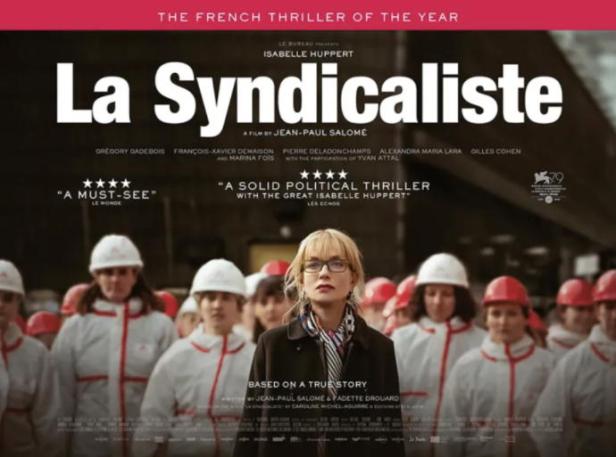
and, for completeness, coming to the sadly overlooked Square Chapel between 21-26 July. Still plenty of time to catch this in the forbidding seating at this venue. Maybe bring a cushion.
LikeLike
I agree with much of what Roy writes but I also had reservations. These are to do with the plotting of the movie. I offer two examples. As Roy notes, the movie opens with a sequence at a plant in Hungary. Kearney reports this to the French company and a report is ordered. But we never find the result. I suspect that the opening sequence is to show the character involved in trade union action, since the rest of the film is very much set in offices and domestic spaces. Then, at the end, [not detailing the resolution], we see Kearney addressing a meeting of French MPs. She delivers a brief personal statement. I think such a meeting would have been about the actual industrial events. Shortly before we see a lawyer address a court; he details the police investigation, thus providing viewers with the catalogue of failings. A similar address at this final meeting could have served a similar function on the central issue.
I definitely think the title is worth seeing; but a little preparatory homework will make it clearer to follow.
LikeLike
Yes, there is a lot of ‘plot’. I think we do learn at the beginning that the CEO will support the women workers in Hungary, but then she is replaced. The union issues are rather taken over by Kearney’s personal stories but we do know she was correct about what would happen to Areva. At the end I think Kearney is addressing what appears to be the French equivalent of an Official Enquiry under the British system.
LikeLike